Did you know that small onions are grown and eaten in more countries than any other vegetable? These tiny powerhouses of flavor have a rich history, dating back to prehistoric times, and they have been celebrated for their taste and health benefits by ancient civilizations such as the Egyptians, Greeks, and Indians. Today, small onions continue to be a culinary staple, enhancing the flavor and texture of dishes from soups and sauces to entrees and salads. If you’re looking to elevate your cooking to the next level, small onions are the secret ingredient you need.
Key Takeaways:
- Small onions are grown and eaten in more countries than any other vegetable.
- They have a rich history and have been celebrated for their flavor and health benefits.
- Small onions enhance the taste and texture of various dishes.
- They are versatile and can be used in a wide range of recipes.
- Incorporating small onions into your cooking can elevate the flavor of your dishes.
The Many Types of Small Onions
When it comes to small onions, there is a wide variety to choose from. Each type of small onion has its own unique flavor and texture, adding depth and complexity to your culinary creations. Let’s explore the most commonly found types of small onions:
- Red onions: These small onions have a vibrant red hue and a mild to sweet flavor. They are great for adding a pop of color to salads and sandwiches.
- Yellow onions: With a golden yellow skin and a pungent flavor, yellow onions are a versatile choice for cooking. They are commonly used in soups, stews, and sautés.
- White onions: Known for their sharp and tangy flavor, white onions are often used in Mexican and Southwestern cuisine. They work well in salsas, guacamole, and ceviche.
- Sweet onions: As the name suggests, sweet onions have a mild and slightly sweet taste. They are perfect for caramelizing and adding a touch of sweetness to dishes.
- Green onions: Also known as scallions, green onions have a mild flavor and are commonly used as a garnish or in Asian dishes, such as stir-fries and noodle soups.
- Shallots: Small and elongated, shallots have a delicate flavor that is both sweet and savory. They are often used in dressings, sauces, and French cuisine.
- Pearl onions: These small onions are about the size of a marble and have a sweet and mild flavor. They are typically used in stews, roasts, and pickled dishes.
- Red pearl onions: Similar to pearl onions, red pearl onions have a slightly stronger flavor and add a colorful touch to your dishes.
As you can see, each type of small onion brings its own unique characteristics to the table. Whether you’re looking for a bold and pungent flavor or a sweet and savory taste, there’s a small onion variety to suit your culinary needs.
Now that we’ve explored the many types of small onions, let’s move on to the next section and learn how to grow these flavorful gems.
How to Grow Small Onions
Growing small onions is a rewarding and straightforward process that can be done in various regions. Whether you have a spacious garden or limited space for containers, you can cultivate small onions to enjoy their fresh flavors in your cooking. Here are the steps to successfully grow small onions:
- Choose the right onion variety: Small onions come in different varieties, each with its own unique flavor and characteristics. Some popular options include red onions, yellow onions, and pearl onions. Select the variety best suited to your culinary preferences and growing conditions.
- Prepare the soil: Small onions thrive in well-draining soil. Before planting, loosen the soil and remove any weeds or debris. Incorporate organic matter, such as compost or aged manure, to enhance soil fertility.
- Planting the onions: Small onions can be grown from seeds or sets, which are small, immature onions. If starting from seeds, sow them directly into the soil, following the recommended planting depth and spacing. Alternatively, you can use sets, planting them with the pointed side up.
- Provide the right conditions: Small onions require full sun exposure, receiving at least 6-8 hours of sunlight per day. Water the onions regularly, providing enough moisture to keep the soil consistently moist but not waterlogged.
- Adequate spacing: To ensure proper bulb development, it’s essential to provide adequate spacing between the onion plants. Typically, small onions should be planted 4-6 inches apart in rows that are 12-18 inches apart.
- Weed and fertilize: To prevent weeds from competing with the onion plants for nutrients and water, regularly weed the area around the onions. Fertilize the onions every few weeks with a balanced fertilizer to promote healthy growth and bulb development.
- Harvesting small onions: Small onions usually take about 90-120 days to mature, depending on the variety. Monitor the growth of the onion plants and look for signs of maturity, such as yellowing foliage. Once the foliage has dried and toppled over, gently lift the onions from the soil using a garden fork or a similar tool.
Now that you know how to grow small onions, you can enjoy the satisfaction of harvesting your own flavorful and fresh onions. Whether you use them in salads, stir-fries, or sautés, homegrown small onions will add a delightful touch to your culinary creations.
Remember, growing onions is a labor of love that requires patience and care. With the right conditions and proper attention, you can successfully cultivate small onions and savor their delicious flavors.
So, get your hands dirty and embark on the journey of growing small onions in your own backyard!
| Benefits of Growing Small Onions | Challenges to Consider |
|---|---|
|
|
“Growing your own small onions not only allows you to enjoy their incredible flavors but also gives you a sense of pride and accomplishment. Embrace the process, be attentive to their needs, and you’ll be rewarded with a bountiful harvest of delicious small onions.”
Small Onion Recipes for Flavorful Meals
Small onions are a versatile ingredient that can take your cooking to the next level. Whether you’re looking to add depth to your soups, create a tangy pickle, or enhance the flavor of your salads, small onions have got you covered. Here are some delicious recipes that showcase the unique flavor and texture of small onions:
Caramelized Onion Soup
Indulge in a comforting bowl of caramelized onion soup, where the natural sweetness of small onions is brought out through slow cooking. This velvety soup is the perfect blend of flavors, with a touch of herbs and a hint of cheese. It’s a soul-warming dish that will delight your taste buds.
Onion Tarts
Impress your guests with savory onion tarts that showcase the caramelized goodness of small onions. The flaky pastry crust perfectly complements the rich and sweet onion filling. These tarts make for a delightful appetizer or a light meal paired with a fresh salad.
Onion Pickles
Add a tangy twist to your dishes with homemade onion pickles. Thinly sliced small onions are pickled in a mixture of vinegar, spices, and herbs, resulting in a zesty and crunchy condiment. These pickles are a versatile addition to sandwiches, burgers, or charcuterie boards.
Onion Rings
Crunchy, golden, and delicious, onion rings are a beloved classic. Coated in a crispy batter, small onion rings are fried to perfection, resulting in a satisfying snack or a crowd-pleasing side dish. Serve them with your favorite dipping sauce for an extra burst of flavor.
Onion Salads
Light and refreshing, onion salads bring a burst of flavor to any meal. Combine thinly sliced small onions with crisp lettuce, juicy tomatoes, and tangy dressing for a simple yet satisfying salad. You can also experiment with different ingredients like feta cheese, olives, or avocado to create your own unique salad masterpiece.
Onion-Based Sauces and Dressings
Small onions form the flavorful base of many delicious sauces and dressings. From tangy barbecue sauce to creamy onion dip, these condiments add richness and complexity to your dishes. Create your own signature sauces and dressings by incorporating small onions into your recipes.
These small onion recipes offer a wide range of flavors and culinary possibilities. Whether you’re a seasoned chef or a home cook, these recipes will inspire you to explore the versatility of small onions in your cooking.
| Recipe | Description |
|---|---|
| Caramelized Onion Soup | A velvety soup with the natural sweetness of small onions, herbs, and a hint of cheese. |
| Onion Tarts | Savory tart shells filled with caramelized small onions for a delightful appetizer or light meal. |
| Onion Pickles | Thinly sliced small onions pickled in vinegar, spices, and herbs for a tangy and crunchy condiment. |
| Onion Rings | Crunchy and golden fried rings made from small onions, perfect as a snack or side dish. |
| Onion Salads | Refreshing salads with thinly sliced small onions, crisp lettuce, juicy tomatoes, and tangy dressings. |
| Onion-Based Sauces and Dressings | Flavorful sauces and dressings made with small onions as the base, adding richness and complexity to dishes. |
The Health Benefits of Small Onions
When it comes to small onions, their flavorful taste is just the beginning. These humble vegetables are packed with nutrients that can improve both your physical and digestive health. Not to mention, small onions are low in calories, making them a guilt-free addition to your meals.
One of the key health benefits of small onions is their high fiber content. Fiber plays a crucial role in aiding digestion, promoting bowel regularity, and preventing constipation. By incorporating small onions into your diet, you can support a healthy digestive system and maintain optimal gut health.
The small onions are also an excellent source of vitamin C, known for its immune-boosting properties. Vitamin C is an essential nutrient that helps protect your body against infections and supports the production of collagen, a protein that keeps your skin healthy and youthful.
Additionally, small onions contain calcium and iron, two vital minerals that contribute to various bodily functions. Calcium is essential for maintaining strong bones and teeth, while iron plays a crucial role in transporting oxygen throughout your body, preventing fatigue and promoting overall well-being.
But there’s more to small onions’ health benefits. These vegetables act as prebiotics, which means they provide nourishment to the good bacteria in your gut. A healthy balance of gut bacteria is important for proper digestion, nutrient absorption, and immune function.
Regularly consuming small onions can also have anti-inflammatory effects. They contain compounds, such as quercetin and sulfur compounds, which have been shown to reduce inflammation in the body. This can help alleviate symptoms of chronic inflammation and contribute to overall better health.
Moreover, small onions have been associated with heart health benefits. Research suggests that the antioxidants found in onions may help reduce the risk of heart disease by preventing the oxidation of cholesterol and promoting healthy blood circulation.
So, the next time you’re preparing a delicious meal, don’t forget to include small onions in your recipes. Not only will they enhance the flavor of your dishes, but they’ll also provide you with a range of health benefits that promote overall well-being.
Where to Buy Small Onions
Looking to get your hands on some small onions to enhance the flavor of your dishes? You’re in luck! Small onions are readily available at various locations, ensuring you can find them conveniently.
You can find small onions at your local grocery stores, where they are usually stocked in the produce section. Keep an eye out for the vibrant displays of small onions, showcasing their fresh and appetizing appeal. Look for well-supplied and reputable grocery stores in your area that prioritize the quality and freshness of their produce.
Additionally, farmers markets are an excellent source for purchasing small onions. These markets often feature locally grown and organic produce, including a wide selection of small onions. By buying directly from local farmers, you not only support the community but also ensure the freshness and authenticity of the onions you bring home.
If you prefer the convenience of online shopping, you can explore various online retailers that offer small onions. Simply visit their websites, browse their selection, and have the onions delivered straight to your doorstep. Online retailers often provide detailed descriptions and customer reviews, helping you make an informed choice.
Choosing and Storing Small Onions
When buying small onions, it’s essential to choose wisely to ensure their quality and freshness. Look for small onions that are firm, free from blemishes, and have little to no scent when whole. These characteristics indicate that the onions are in good condition and will provide maximum flavor when cooked.
To maintain the freshness and flavor of small onions, proper storage is crucial. Store them in a cool, dry place away from direct sunlight. A pantry or cellar is an ideal spot. Make sure to separate any bruised or damaged onions from the rest to prevent spoilage.
| Where to Buy | Advantages |
|---|---|
| Grocery Stores |
|
| Farmers Markets |
|
| Online Retailers |
|
No matter where you choose to buy your small onions, remember to prioritize freshness and quality. By selecting the best small onions and storing them properly, you can enjoy their incredible flavor and enhance the overall taste of your culinary creations.
Small Onions: Nutritional Facts
When it comes to small onions, not only are they bursting with flavor, but they also pack a nutritional punch. These nutrient-dense vegetables are low in calories and fat, making them a healthy addition to your meals. Let’s explore the nutritional benefits of small onions and how they can contribute to a balanced and nutritious eating plan.
I believe that good nutrition is the foundation for a vibrant and healthy life. Incorporating small onions into your diet is an easy way to boost your nutrient intake and enhance your overall well-being.
The Nutritional Profile of Small Onions
Small onions are rich in fiber, vitamins, and minerals, making them an excellent choice for adding nutritional value to your meals. Here’s a breakdown of the key nutrients found in small onions:
| Nutrient | Amount per Serving |
|---|---|
| Fiber | 2 grams |
| Vitamin C | 5% of the recommended daily intake |
| Calcium | 2% of the recommended daily intake |
| Iron | 2% of the recommended daily intake |
| Antioxidants | Small onions are a rich source of antioxidants, which help protect the body against harmful free radicals. |
As you can see, a serving of small onions offers a good amount of vitamin C, providing a boost to your immune system. Additionally, small onions contain calcium and iron, essential minerals for bone health and oxygen transport in the body. The fiber content in small onions supports healthy digestion and helps you feel fuller for longer.
Ways to Incorporate Small Onions into Your Diet
There are countless delicious ways to enjoy the nutritional benefits of small onions. Here are a few ideas to inspire you:
- Add sautéed small onions to your favorite stir-fry dish.
- Incorporate caramelized small onions into savory tarts or quiches.
- Toss small onions into salads for added crunch and flavor.
- Roast small onions with other vegetables for a tasty side dish.
- Blend small onions into homemade salad dressings or dips.
Small Onions in Cuisine: A Culinary Staple
Small onions are a fundamental component in cuisines worldwide. They play a vital role in a wide range of dishes, from traditional stews and braises to contemporary fusion cuisine. Their unique flavor profile adds depth, texture, and visual appeal to recipes, making them an essential ingredient for culinary enthusiasts.
Small onions can be incorporated into various cooking techniques to achieve diverse flavors and textures. Sautéing small onions brings out their natural sweetness, while roasting or grilling caramelizes them for a rich and savory taste. Pickled small onions provide a tangy and crunchy element, while using them as a garnish lends a pop of flavor and visual contrast to dishes.
“Small onions are the backbone of many culinary traditions, forming the foundation for countless beloved recipes. Their versatility and ability to enhance the overall taste of a dish make them a permanent fixture in my kitchen.”
Small Onions: A World of Possibilities
Small onions are used in an extensive range of global cuisines, showcasing their adaptability and ability to complement different flavors and ingredients. In Italian cuisine, small onions are often featured in pasta dishes, lending their unique taste to carbonara or adding sweetness to a classic tomato sauce. Asian cuisines incorporate small onions in stir-fries, adding a burst of flavor and vibrant color to the dish.
Spanish cuisine celebrates small onions in traditional tapas like patatas bravas, where their caramelized sweetness balances the spiciness of the sauce. In Indian cuisine, small onions are a staple in curries and other flavorful dishes such as biryani and sambar, enhancing the complexity of the spices used.
Small onions are also widely used in Middle Eastern and North African cuisines, where they are incorporated into tagines, couscous dishes, and mezze platters. The sweet and savory nature of small onions adds depth and character to these flavorful and aromatic creations.
The possibilities are endless when it comes to incorporating small onions into your cooking. From hearty winter stews to light summer salads, small onions are a versatile ingredient that can take your dishes to new heights.
The Flavorful Appeal of Small Onions
One of the standout qualities of small onions is their ability to impart a distinct flavor to dishes. Their delicate yet robust taste adds complexity and depth to a wide range of recipes. The natural sweetness of caramelized small onions enhances the savory profile of meats, while their crisp texture provides a refreshing contrast to salads and sandwiches.
The aromatic compounds found in small onions, such as sulfur compounds, contribute to their unique flavor and make them ideal for creating well-balanced dishes. Whether you’re aiming for a bold, spicy kick or a subtle, savory note, small onions can be tailored to suit your culinary preferences.
The Visual Appeal of Small Onions
Small onions not only provide flavor but also enhance the visual appeal of dishes. Their vibrant colors, ranging from reds and yellows to whites and purples, add visual interest and create a striking contrast against other ingredients. They can bring life and brightness to soups, stews, and salads, making them visually appealing as well as delicious.
Elevate Your Dishes with Small Onions: Tips and Tricks
To make the most of small onions in your cooking, consider these tips and tricks:
- Fresh-cut onions offer mild to strong flavors depending on the variety.
- Sweating onions over low heat softens their flavor and texture.
- Sautéing onions over high heat creates a rich, sweet flavor.
- Caramelizing onions slowly and delicately brings out deep, sweet flavors.
Experiment with different cooking methods to discover your preferred way of working with small onions. Whether you’re sautéing them to add a burst of flavor to a stir-fry or caramelizing them to create a savory topping for your burgers, small onions can truly elevate your dishes.
| Cooking Method | Flavor Profile | Best Uses |
|---|---|---|
| Sweating Onions | Mild and Soft | Enhancing soups, stews, and sauces |
| Sautéing Onions | Rich and Sweet | Stir-fries, pasta dishes, and sizzling fajitas |
| Caramelizing Onions | Deep and Sweet | Gourmet burgers, French onion soup, and caramelized onion tarts |
No matter how you choose to cook with them, small onions are sure to enhance the flavors of your favorite dishes and delight your taste buds.
Try this Recipe: Caramelized Onion and Goat Cheese Tart
Take your culinary skills to the next level with this delicious caramelized onion and goat cheese tart. The sweetness of the caramelized onions perfectly complements the tanginess of the goat cheese, creating a flavor combination that will delight your palate. Here’s what you’ll need:
- 1 pre-made pie crust
- 4 large small onions, thinly sliced
- 2 tablespoons butter
- 1 tablespoon balsamic vinegar
- 1 tablespoon brown sugar
- 4 ounces goat cheese, crumbled
- Fresh thyme leaves for garnish
Preheat your oven to 375°F (190°C). Roll out the pre-made pie crust and press it into a tart pan. In a large skillet, melt the butter over medium heat. Add the sliced onions and cook until caramelized, stirring occasionally. This will take about 30 minutes. Stir in the balsamic vinegar and brown sugar. Remove from heat and let cool slightly. Spread the caramelized onions evenly over the pie crust. Top with crumbled goat cheese. Bake in the preheated oven for 20-25 minutes, or until the crust is golden brown and the cheese is bubbly. Garnish with fresh thyme leaves and serve warm. Enjoy!
This tart makes for a delicious appetizer or light lunch. The combination of sweet caramelized onions and creamy goat cheese is simply irresistible. Give it a try and impress your family and friends with your culinary skills!
Gills Onions: Your Source for Fresh-Cut Small Onions
When it comes to small onions, quality and freshness matter. That’s why I highly recommend Gills Onions as your go-to source for fresh-cut small onions. With over 35 years of experience in the industry, Gills Onions stands out for their commitment to exceptional quality and taste.
At Gills Onions, their growers use best practices and conservation techniques to cultivate the finest small onions. Whether you’re looking for yellow onions or red onions, Gills Onions offers a variety of small onion options to suit your culinary needs.
One of the standout features of Gills Onions is the long shelf life of their products. Their small onions have the longest shelf life in the industry, ensuring that you can enjoy their freshness for longer periods of time. Plus, Gills Onions is dedicated to providing preservative-free onions, allowing you to savor the natural flavors without any additives.
To learn more about Gills Onions and to purchase their fresh-cut small onions, simply reach out to their sales department. They will be more than happy to assist you and provide all the information you need to make your purchase.
Why Choose Gills Onions?
Gills Onions is a trusted name in the industry, known for their exceptional quality and commitment to freshness. When you buy from Gills Onions, you can have confidence that you’re getting the finest small onions for your cooking endeavors.
Benefits of Fresh-Cut Small Onions
- Convenience: Fresh-cut small onions save you time and effort in the kitchen, allowing you to focus on creating delicious meals.
- Consistent Flavor: With Gills Onions’ dedication to quality, you can expect consistent flavor in every batch of their fresh-cut small onions.
- Enhanced Dishes: The fresh, vibrant taste of small onions will elevate your dishes, adding depth and complexity to your culinary creations.
- Versatility: Small onions can be used in a wide range of recipes, from soups and stews to stir-fries and salads, making them a versatile ingredient to have in your pantry.
Experience the difference of fresh-cut small onions from Gills Onions and take your cooking to the next level. Trust their expertise and enjoy the convenience and flavor they bring to your kitchen.
“Fresh-cut small onions from Gills Onions have become an essential part of my cooking. The quality is unmatched, and the flavor they add to my dishes is simply incredible.” – Jane Doe, Home Cook
Small Onions: Versatile and Delicious
Small onions are a must-have ingredient in the kitchen. Their versatility allows them to be used in a wide range of recipes, adding flavor and depth to dishes. Whether you’re sautéing, caramelizing, or using them as a garnish, small onions bring a unique taste and texture to culinary creations. Explore the endless possibilities of small onions in your cooking.
The Flavorful Small Onion
Small onions are known for their intense and distinctive flavor. They have a sweet and slightly pungent taste that can transform any dish. From soups and stews to stir-fries and salads, small onions add a burst of flavor that elevates the overall taste of the dish.
“Small onions are like flavor bombs that explode in your mouth, bringing richness and complexity to every bite.”
Versatility at Its Best
Small onions are incredibly versatile in the kitchen. They can be used in both raw and cooked preparations, providing different flavors and textures. When raw, small onions add a fresh and crisp bite to salads and sandwiches. When cooked, they become tender and sweet, often melting into the dish and infusing it with their distinct flavor.
One popular way to use small onions is by caramelizing them. The slow cooking process brings out their natural sweetness and creates a rich, golden brown flavor that enhances a wide range of dishes. Caramelized small onions are perfect for topping burgers, pizzas, and savory tarts, or as a flavorful addition to soups and sauces.
A Versatile Ingredient
Small onions can be incorporated into various cuisines and dishes. They pair well with a variety of other ingredients, such as meats, vegetables, and grains. Their small size and mild flavor make them a versatile addition to recipes, allowing them to enhance the overall taste without overpowering other ingredients.
“Small onions are like culinary chameleons that adapt to any dish, adding their unique touch without stealing the spotlight.”
Recipes Taking Small Onions to the Next Level
Here are some delicious recipes that showcase the versatility and flavor of small onions:
| Recipe | Description |
|---|---|
| French Onion Soup | A classic soup made with caramelized small onions, beef broth, and topped with melted cheese. |
| Roasted Vegetable Medley | A colorful mix of roasted vegetables, including small onions, bell peppers, zucchini, and cherry tomatoes. |
| Grilled Steak with Onion Marmalade | A tender grilled steak topped with a flavorful onion marmalade made with small onions, balsamic vinegar, and honey. |
| Pasta Primavera | A light and vibrant pasta dish with fresh small onions, asparagus, peas, and cherry tomatoes. |
These recipes demonstrate the versatility of small onions and how they can enhance the flavor of different dishes. From comforting soups to vibrant salads, small onions can elevate your meals to new heights.
No matter how you choose to use them, small onions are an essential ingredient that brings both flavor and creativity to your cooking. Experiment with different recipes and cooking techniques to unlock the full potential of these versatile and delicious onions.
Conclusion
Small onions are a true culinary treasure, adding a burst of flavor to any dish. From their intriguing history to their abundant health benefits, these onions are a must-have ingredient in every kitchen. Whether you’re a seasoned chef or a passionate home cook, incorporating small onions into your recipes will take your dishes to the next level.
With their diverse varieties, small onions offer endless possibilities in cooking. Their versatility allows them to be used in a wide range of recipes, from soups and stews to salads and stir-fries. No matter how you choose to cook them, small onions provide a unique depth and complexity that enhances the overall dining experience.
Beyond their flavor, small onions offer numerous health benefits. Packed with essential nutrients and antioxidants, they can support digestive health, boost your immune system, reduce inflammation, and improve heart health. So not only do small onions make your meals taste delicious, but they also contribute to your overall well-being.
Embrace the flavor and health benefits of small onions and let your creativity flow in the kitchen. Whether you’re sautéing them to develop their natural sweetness or using them raw to add a punch to your salads, small onions are here to elevate your cooking to new heights. So go ahead, explore the exciting world of small onions and unlock the incredible potential of this amazing vegetable!

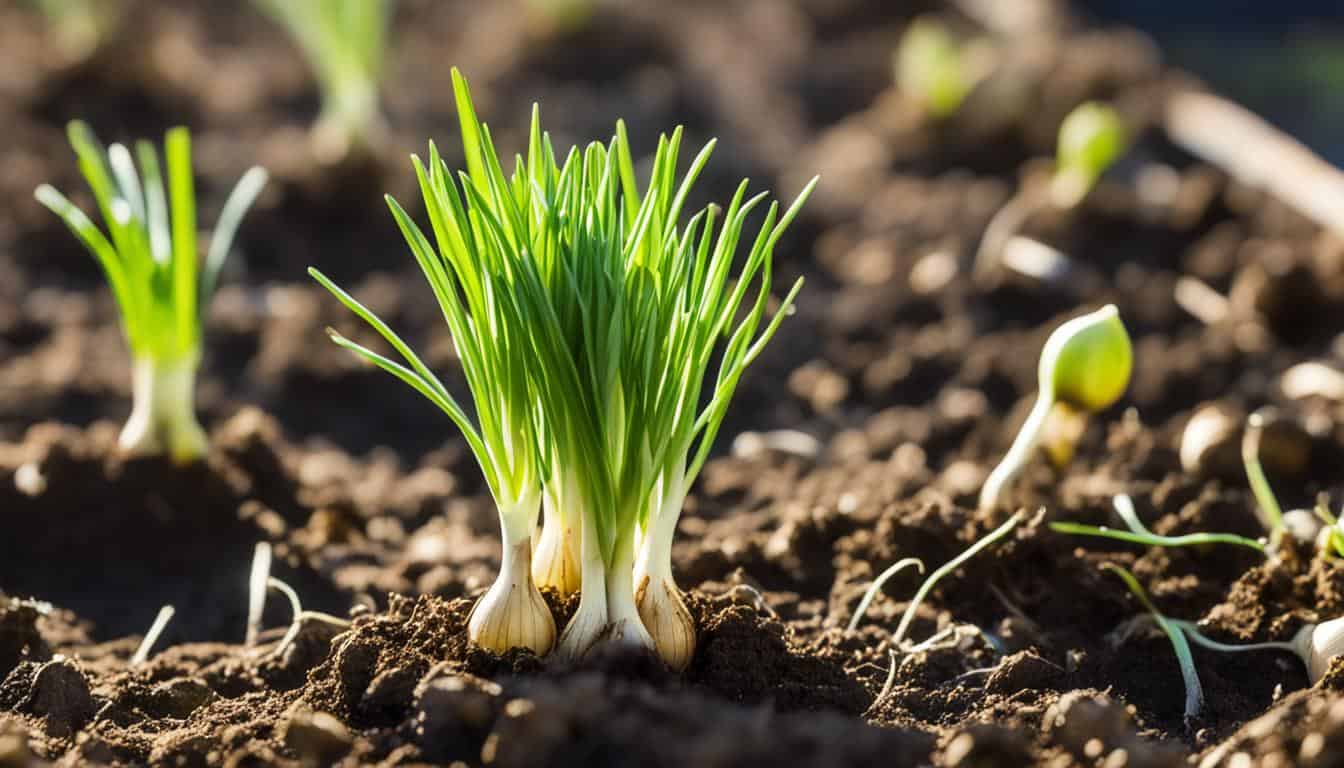
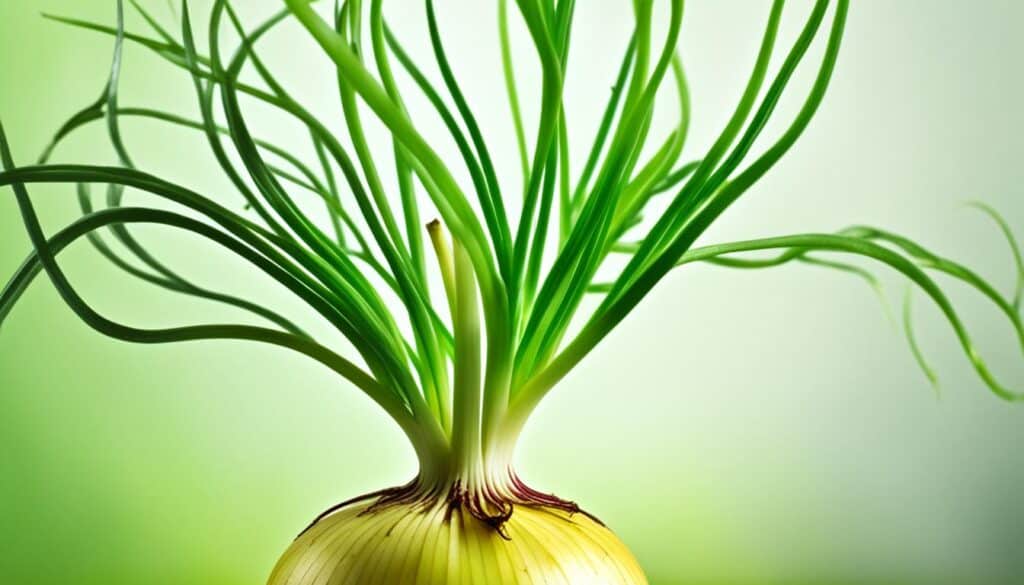
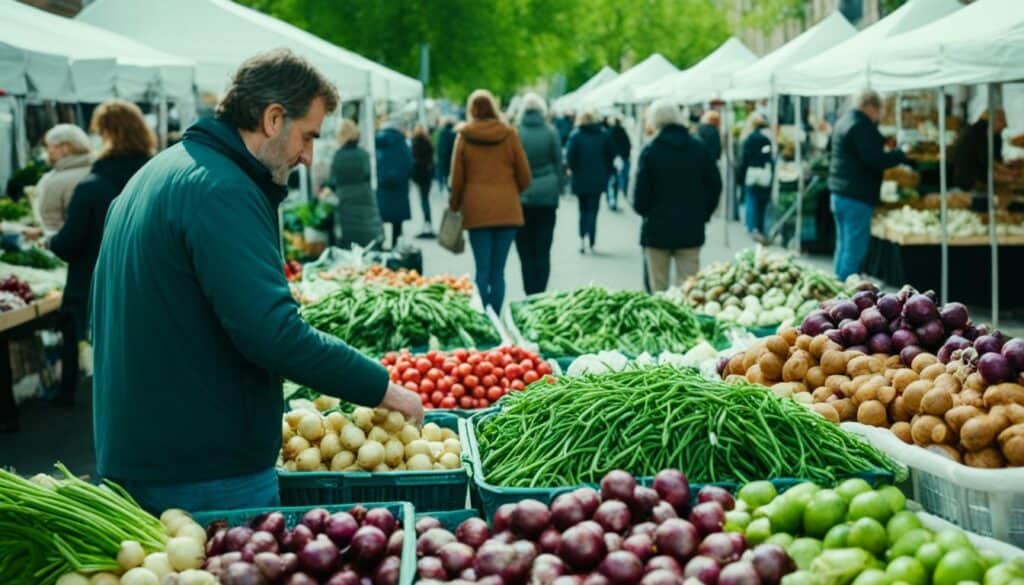
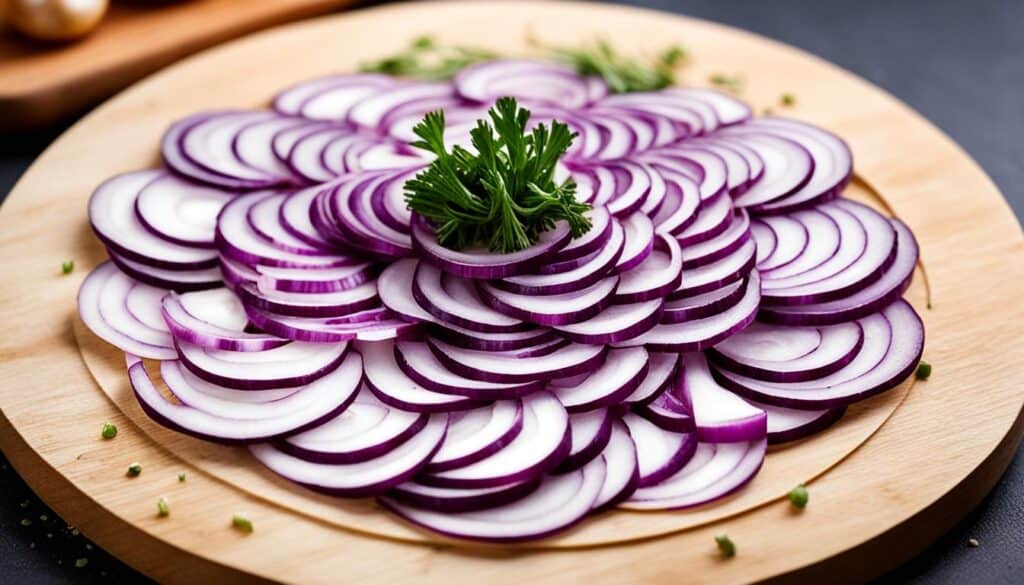
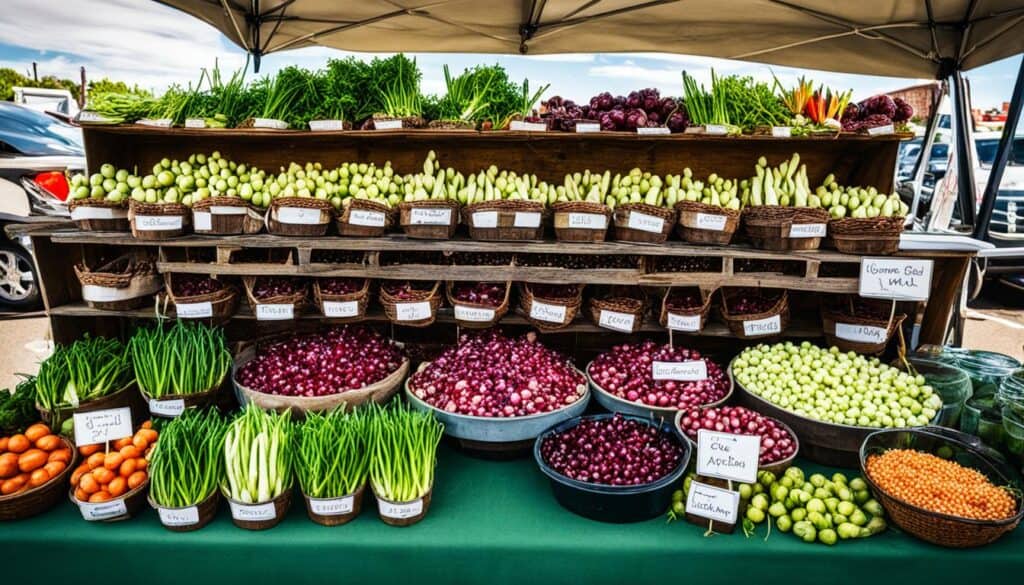
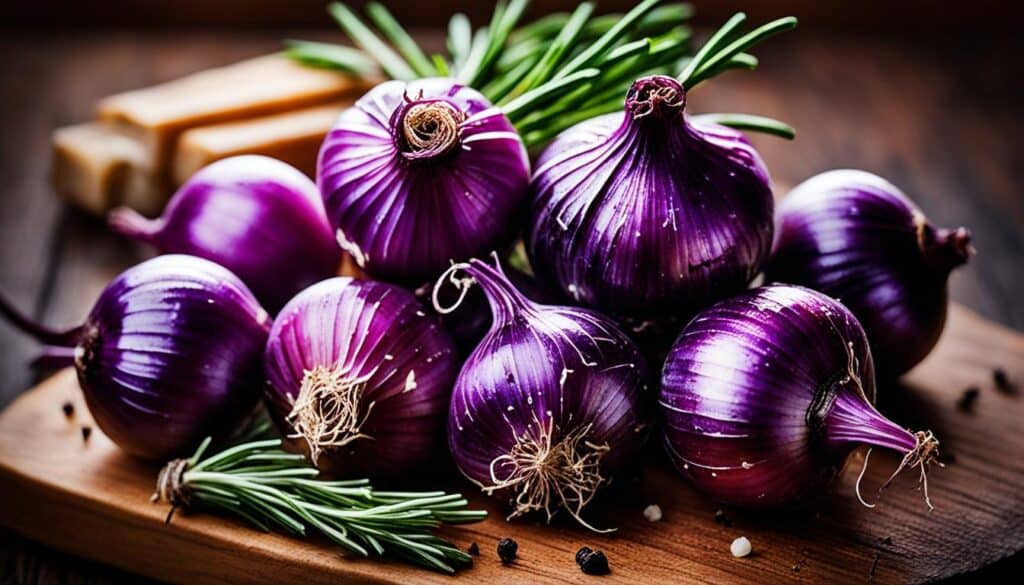



Leave a Reply